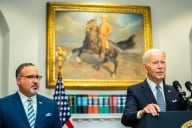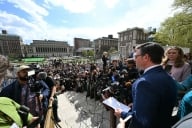You have /5 articles left.
Sign up for a free account or log in.
A James Madison University administrator told a student who alleged she had been sexually assaulted that discussing her case with reporters could lead to charges of violating the institution's policies on interfering with its adjudication process.
The student, Caroline Whitlow, said she feels like college leaders were trying to discourage her from speaking. And the message from the administrator has been panned by at least one civil liberties organization, which said the student's free speech rights allow her to talk freely with the news media. The university told Inside Higher Ed it advises students of potential consequences of discussing their stories with news outlets but has never punished a student for doing so.
Whitlow, a James Madison sophomore, told Inside Higher Ed she was sexually assaulted while she was drunk on a study abroad trip last summer. She never reported the encounter, she said, wanting to “put it behind her.” But returning to the campus in the fall, she said, she saw her attacker much more often than she had the previous year, and in December she told the Office of Student Accountability and Restorative Practices about the assault.
“I felt like I wasn’t going to heal until he was removed from campus,” Whitlow said.
After an eight-hour hearing, a panel of three university administrators last month found Whitlow’s assailant “not responsible,” she said. Whitlow has decided to appeal the decision, and the case is set to be reconsidered this month.
In March, she posted a Facebook status venting her frustrations, which eventually was shared much more widely than she had expected -- more than 320 times as of Thursday evening.
Whitlow earlier this month emailed the adviser in her case, Tammy Knott, senior assistant director of the accountability office, asking if she “could get in trouble” for interfering with the process if she talked with reporters, since her Facebook status had gone viral.
“I assume this just means not to do things like tell the whole internet to write letters to [Dean of Students] Josh Bacon, but I wanted to check in with you and see if you have any insight on that,” Whitlow wrote to Knott.
Knott responded, “Since you are in the appeal process of the case and the Dean of Students still has to review the case, there is not yet a final decision. Until there is a final decision, you cannot do anything that could be seen as interfering with the accountability process. Disclosing information about the case to others who would be writing a news story based on this case could be considered interfering with the process, depending on the circumstances, and you could be charged under the student handbook policies.”
Knott then (presumably accidentally) cited a policy number in the university’s student standards of conduct that doesn’t exist. But she clearly referenced the institution’s rules on not interfering with any of the university’s investigative and hearing processes.
“You are correct that urging other people to interfere in the process (by writing to the Dean of Students, in your example) would potentially fall under the interference policy,” Knott wrote.
The Daily Breeze, the student newspaper, wrote an article about Whitlow’s case and about the warning against talking to reporters, which she said was widely read and eventually picked up by free speech advocates such as the Foundation for Individual Rights in Education, which condemned the institution.
Robert Shibley, FIRE’s executive director, wrote in a blog post that First Amendment protections allow a student to publicly disagree with the verdict of a sexual assault case.
He called it “alarming” that the university believes going public with the case could affect its outcome.
“It suggests that JMU knows that its Title IX process is so poorly insulated from public pressure that criticism alone (as opposed to new facts or the exposure of bad procedures) may cause the school to reverse its position on whether a sexual assault took place,” Shibley wrote. “If that’s true, that’s a huge indictment of the process itself.”
A James Madison spokesman, Bill Wyatt, said the Daily Breeze piece, on which FIRE based its criticisms, took the situation out of context. He said the student journalists there only had access to one piece of correspondence from the university.
Never before has the university come down on students for talking to the news media, Wyatt said.
“When our counselors talk to students, they never say they can’t talk about their case,” Wyatt said. “What we do try to do is to get them to understand that there are consequences to actions, which could very well mean they are sued by a private party. But we’ve never charged a student with interference” for speaking to the media.
Knott's email does not mention the possibility of legal backlash and only mentions the possible policy violations.
Wyatt wrote an op-ed in response to the Daily Breeze story, in which he stressed that the “university doesn’t silence students who come forward.”
“Rather, it provides resources and counseling to students to help them understand the process and to get the support they need. The university staff who work on these issues are well trained and extraordinarily dedicated to addressing this significant societal problem,” he wrote.
Wyatt noted -- in an attempt to show the university's commitment to ferreting out sexual assault -- that the accountability office has found the accused responsible in 18 of 36 sexual misconduct cases it handled over the last four academic years. Students in 10 of the cases were found not responsible, and the other cases were dropped or are still pending. (Note: This paragraph has been updated from an earlier version to clarify the outcome of the cases.)
Still, Whitlow is unconvinced that the university treated her properly. She is participating in a silent protest against sexual violence, and the university’s historic response to it, in the campus quad today.
“What’s really going to help is if the university can admit that things aren’t perfect and that things are handled poorly,” she said. “Then it can become a better environment for everyone.”








